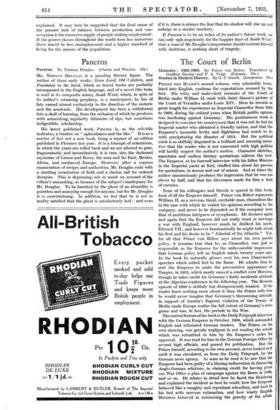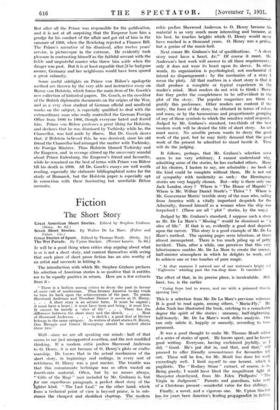The Court of Berlin
PRINCE VON BULOW'S second volume, very admirably trans. lated into English, confirms the expectations aroused by the first. His witty and malevolent memoirs of the Court of Berlin under William II. rank with Saint Simon's picture of the Court of Versailles under Louis XIV. Here he records at great length his experiences as Imperial Chancellor from 1903 to 1909, during the critical years when British public opinion was hardening against Germany. His posthumous work is designed to convince his countrymen that it was not he but his Imperial master who alienated a friendly nation, and that the Emperor's incurable levity and flightiness had much to do with precipitating the disaster of 1914. But the political crisis is so skilfully disguised in a brilliant and amusing narra- tive that the reader who is not concerned with high politics will hardly suspect the author's motive. Character sketches, anecdotes and endless literary quotations enliven the text. The Emperor, at his farewell interview with his fallen Minister in the Imperial yacht at Kiel, chaffed him about his passion for quotations, in season and out of season. And at times the author unconsciously produces the impression that he was too clever by half, and that his cleverness made for him a host of enemies.
None of his colleagues and friends is spared in this book, least of all the Emperor himself. Prince von Billow represents William II. as a nervous, timid, excitable man, chameleon-like in the ease with which he varied his opinions according to his company, and never to be depended on if the company were that of ambitious intriguers or sycophants. He declares again and again that the Emperor did not really want or envisage a war with England, however much he disliked his uncle, Edward VII., and however bombastically he might talk about his fleet and his desire to be " Admiral of the Atlantic." Yet, for all that Prince von Billow says about his own pacific policy, it remains true that he, as Chancellor, was just as responsible as the Emperor for the unfavourable impression that German policy left on English minds twenty years ago. In the book he naturally glosses over his own Chauvinistic speeches which added fuel to the flame. He admits that he sent the Emperor to make the provocative appearance at Tangier, in 1905, which nearly caused a conflict over Morocco, though he takes credit for Germany's fairly moderate attitude at the Algeciras conference in the following year. The Bosnian episode of 1908 is skilfully but disingenuously treated. If the reader knew nothing more about it than the Prince tells him he would never imagine that Germany's threatening attitude in support of Austria's flagrant violation of the Treaty of Berlin made Europe realize the full extent of Germany's arro• gance and was, in fact, the prelude to the War.
The central feature of the book is the Daily Telegraph interview with the German Emperor in October, 1908, which astounded English and infuriated German readers. The Prince, on his own showing, was grossly negligent in not reading the article which was submitted to him by the Emperor's order for approval. It was read for him in the German Foreign Office by several high officials, and passed for publication. But the Prince himself, according to his own account, never looked at it until it was circulated, as from the Daily Telegraph, by the German news agency. As soon as he read it he saw that the Emperor had been guilty of a blazing indiscretion in discussing Anglo-German relations, in claiming credit for having given our War Office a plan of campaign against the Boers in 1900, and so on. He relates in detail how he faced the Reichstag and explained the incident as best he could, how the Emperor behaved like a naughty and repentant schoolboy, and took to his bed with nervous exhaustion, and how wisely EnglishMinisters behaved in minimising the gravity of the a ffaw.
But after all the Prince was responsible for the publication, and it is not at all surprising that the _Emperor bore him a grudge for his conduct of the affair and got rid of him in the summer of 1909, when the Reichstag rejected a Finance Bill. The Prince's narrative of his dismissal, after twelve years' service, is picturesque in the extreme. He evidently took pleasure in contrasting himself as the faithful servant with the fickle and ungrateful master who threw him aside when the danger was past. But it is at least arguable that,',if he had gone sooner, Germany and her neighbours would have been spared a great calamity.
Some useful sidelights on Prince von Billow's apologetic method are thrown by the very able and instructive essay on Baron von Holstein, which forms the main item of Dr. Gooeh's new collection of historical papers. Dr. Gooch, as the co-editor of the British diplomatic documents on the origins of the War, and as a very close student of German official and -unofficial works on.the subject, is especially qualified to deal With the extraordinary man who really controlled the German Foreign Office from 1890 to 1906, though everyone hated and feared him. Prince von Billow professes a great liking for Holstein, and declares that he was dismissed by Tschirsky while he, the Chancellor, was laid aside by illness. But Dr. Gooch shows that, if Holstein believed this; he was deceived, since his old friend the Chancellor had arranged the matter with Tschirsky, the Foreign Minister. Thus Holstein blamed Tschirsk-y and the Emperor, and in revenge stirred up the unsavoury scandal about Prince Eulenburg, the Emperor's friend and favourite, while he remained on the best of terms with Prince von Billow till his death in 1909. All Dr. Gooch's essays are well worth reading, especially the elaborate bibliographical notes for the study of Bismarck, but the Holstein paper is especially apt in connexion with these fascinating but unreliable Billow memoirs.















































 Previous page
Previous page